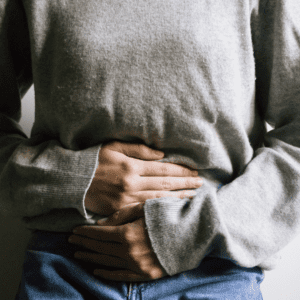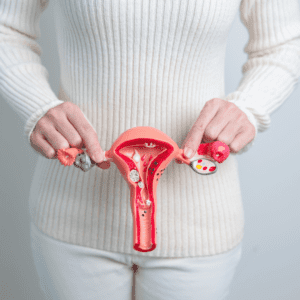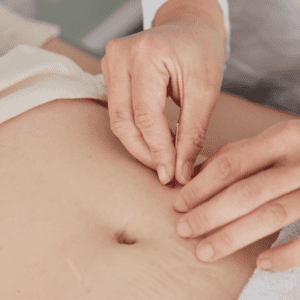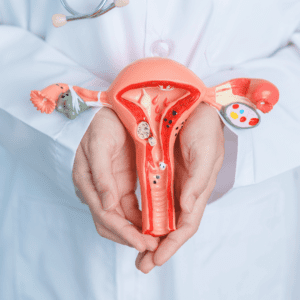Everything You Need to Know About Endometriosis: Insights from an Acupuncturist and Gynaecologist
This blog features contributions from three experts in women’s health: Amy Forth, Director of the Acupuncture Pregnancy Clinic and Nutritionist, and Dr Peta Wright (MBBS, FRANZCOG, Masters Reprod Med), a leading gynaecologist and pelvic pain specialist. Drawing on Dr Wright’s presentation at the “Well Women Congress” in June 2023 by Metagenics.
This blog delves into the complexities of endometriosis, offering a holistic approach to diagnosis, management, and fertility support. We’ll explore perspectives from acupuncture, naturopathy, and medical practice that may help you manage endometriosis and optimise your chances of conception.
Acupuncture Pregnancy Clinic is a national network offering acupuncture and Traditional Chinese Medicine to support fertility, IVF cycles, pregnancy and general reproductive health. Visit us at Westmead, Sydney CBD, Alexandria, Gosford, Melbourne, and Mornington.
Endometriosis and Pelvic Pain: A Comprehensive Health Issue
 Pelvic pain is a common condition affecting 15-25% of women, and endometriosis is the leading cause in 11% of cases. This condition can significantly impact fertility by causing inflammation, scar tissue, and impaired ovarian function. Early diagnosis and medical intervention through laparoscopy or hormonal treatments are essential to reducing the risk of chronic pain, but additional therapies such as acupuncture, naturopathy, and lifestyle changes are increasingly recognised for their value in supporting fertility.
Pelvic pain is a common condition affecting 15-25% of women, and endometriosis is the leading cause in 11% of cases. This condition can significantly impact fertility by causing inflammation, scar tissue, and impaired ovarian function. Early diagnosis and medical intervention through laparoscopy or hormonal treatments are essential to reducing the risk of chronic pain, but additional therapies such as acupuncture, naturopathy, and lifestyle changes are increasingly recognised for their value in supporting fertility.
What Is Endometriosis?
 Endometriosis is a chronic inflammatory disease where tissue similar to the endometrium (the lining of the uterus) grows outside the uterus. This condition affects 1 in 10 women and presents in three forms: superficial peritoneal (80%), endometrioma (15%), and deep infiltrating endometriosis (5%). For women seeking to conceive, managing the inflammatory and hormonal components of endometriosis is critical. Both surgical and non-surgical approaches, such as acupuncture and naturopathic therapies, can play a role in this process.
Endometriosis is a chronic inflammatory disease where tissue similar to the endometrium (the lining of the uterus) grows outside the uterus. This condition affects 1 in 10 women and presents in three forms: superficial peritoneal (80%), endometrioma (15%), and deep infiltrating endometriosis (5%). For women seeking to conceive, managing the inflammatory and hormonal components of endometriosis is critical. Both surgical and non-surgical approaches, such as acupuncture and naturopathic therapies, can play a role in this process.
Pain and Fertility: The Limits of Surgery

While many associate endometriosis with pelvic pain, not all women experience it. However, pain and inflammation often interfere with fertility. Surgical options like laparoscopy may remove lesions and improve reproductive outcomes for some, especially those with deep infiltrating endometriosis. However, surgery alone is not a cure-all for either pain or fertility issues. This is where integrative approaches, combining acupuncture, nutrition, and lifestyle modifications, become vital to a comprehensive treatment plan.
Addressing Trauma and Emotional Health

Studies have shown that there is a link between trauma—especially early-life experiences such as adverse childhood events (ACEs) or sexual abuse—and the development of endometriosis. Trauma can disrupt the body’s nervous system and contribute to chronic pain, including pelvic pain. For women with endometriosis, addressing emotional health through a trauma-informed care model is crucial, especially for those trying to conceive. Acupuncture, naturopathy, and mindfulness practices can help heal the nervous system, reduce stress, and improve fertility outcomes.
Acupuncture for Endometriosis: A Key to Managing Pain and Boosting Fertility

Amy Forth, Director of the Acupuncture Pregnancy Clinic, highlights that acupuncture Research suggests that acupuncture helps reduce inflammation, regulate hormones, and improve blood flow to the uterus and ovaries. Electro-acupuncture, in particular, has shown promising results in reducing chronic pain and improving ovarian function in women with endometriosis.
A 2021 study published in *Complementary Therapies in Medicine* found that women with endometriosis who received acupuncture reported significant reductions in pain and improvements in reproductive health. Acupuncture’s ability to regulate the nervous system and immune function makes it a powerful tool for women seeking to conceive naturally.
Hormonal Treatments and Holistic Care

In some cases, hormonal treatments may still be necessary to manage endometriosis-related pain and improve fertility. Options such as hormonal intrauterine devices (IUDs) or oral contraceptives are frequently recommended by doctors.
A Trauma-Informed Approach to Endometriosis Care

For many women, the key to healing from endometriosis lies in feeling safe and connected to their bodies. Trauma-informed care is vital in addressing the psychological and physical effects of chronic pain and endometriosis. Addressing emotional factors, particularly trauma, is also crucial for a well-rounded care plan.
By integrating medical care with acupuncture, anti-inflammatory nutrition, lifestyle changes, and trauma-informed support, women can improve their overall health and boost their chances of conceiving.
Understanding Endometriosis: A Perspective on Chinese Medicine
Endometriosis and Blood Stagnation:
 According to Chinese medicine, endometriosis is often associated with blood stagnation in the pelvic region. Blood stagnation occurs when the flow of blood becomes sluggish or blocked, leading to pain, inflammation, and the formation of abnormal tissues. In the case of endometriosis, these abnormal tissues are found outside the uterus, causing pain during menstruation and other symptoms.
According to Chinese medicine, endometriosis is often associated with blood stagnation in the pelvic region. Blood stagnation occurs when the flow of blood becomes sluggish or blocked, leading to pain, inflammation, and the formation of abnormal tissues. In the case of endometriosis, these abnormal tissues are found outside the uterus, causing pain during menstruation and other symptoms.
Heat and Yang Deficiency:
 Chinese medicine also emphasises the role of heat and yang energy in maintaining healthy blood circulation. Heat and yang are considered active, warming, and invigorating forces within the body. When there is a deficiency of heat and yang, the movement of blood may become compromised, leading to stagnation. This deficiency can result from various factors, including lifestyle, diet, and constitution.
Chinese medicine also emphasises the role of heat and yang energy in maintaining healthy blood circulation. Heat and yang are considered active, warming, and invigorating forces within the body. When there is a deficiency of heat and yang, the movement of blood may become compromised, leading to stagnation. This deficiency can result from various factors, including lifestyle, diet, and constitution.
Clinical Presentation and Warmth:
In clinical practice, it is common to observe that patients with endometriosis often feel cold. . This sensation of coldness can manifest as chilly extremities or abdomen, a preference for warm environments, and sensitivity to cold temperatures. According to Chinese medicine, warming the body can help alleviate blood stagnation and reduce pain associated with endometriosis.
The Role of Warm Food and Drinks:
 To manage endometriosis from a Chinese medicine perspective, incorporating warm foods and drinks into the diet is recommended. Warm foods, such as soups, stews, and herbal teas, can help promote circulation, support the body’s warmth, and enhance overall vitality. These foods are believed to counteract the coldness and stagnation often experienced by individuals with endometriosis.
To manage endometriosis from a Chinese medicine perspective, incorporating warm foods and drinks into the diet is recommended. Warm foods, such as soups, stews, and herbal teas, can help promote circulation, support the body’s warmth, and enhance overall vitality. These foods are believed to counteract the coldness and stagnation often experienced by individuals with endometriosis.
Keeping Feet and Abdomen Warm:
 Another practical approach in Chinese medicine is to ensure that the feet and lower abdomen, where the uterus resides, are kept warm. Cold temperatures can exacerbate blood stagnation and increase discomfort. Wearing warm socks or slippers, using heating pads, or applying warm heat or compresses to the lower abdomen can help improve blood flow, ease pain, and provide relief.
Another practical approach in Chinese medicine is to ensure that the feet and lower abdomen, where the uterus resides, are kept warm. Cold temperatures can exacerbate blood stagnation and increase discomfort. Wearing warm socks or slippers, using heating pads, or applying warm heat or compresses to the lower abdomen can help improve blood flow, ease pain, and provide relief.
Research on Chinese Medicine for Endometriosis:
 There is an increasing body of research examining the effectiveness of Chinese medicine in treating endometriosis. Numerous reviews have analysed trials assessing the impact of Chinese medicine and acupuncture on pain reduction, ovarian function, recurrence rates, and pregnancy rates in individuals with endometriosis.
There is an increasing body of research examining the effectiveness of Chinese medicine in treating endometriosis. Numerous reviews have analysed trials assessing the impact of Chinese medicine and acupuncture on pain reduction, ovarian function, recurrence rates, and pregnancy rates in individuals with endometriosis.
Randomised controlled trials have also explored the use of Chinese medicine to prevent recurrence and enhance pregnancy rates after surgical intervention. Additionally, acupuncture has been studied for its effect on dysmenorrhoea (painful periods), which is crucial to address in Chinese medicine for promoting overall well-being.
The Role of Acupuncture:
Acupuncture, when combined with usual care, has shown promise in reducing pelvic pain associated with endometriosis. A study involving 30 women aged 18-45, diagnosed with endometriosis, demonstrated that twice-weekly acupuncture sessions for eight weeks significantly reduced pelvic pain compared to usual care alone.
The acupuncture group experienced a 42% reduction in pelvic pain after eight weeks, surpassing the minimum clinically important difference threshold. In contrast, the usual care group experienced a 6% increase in pelvic pain over the same period.
Further research and clinical trials are important to explore the potential benefits of Chinese medicine and acupuncture in the treatment of endometriosis. By incorporating these practices into comprehensive care plans, we can improve the well-being and quality of life for women with endometriosis. It is recommended to consult with qualified practitioners of Chinese medicine for personalised advice and tailored treatment options.

PELVIC PAIN

From baseline in the acupuncture group there was a 42% reduction in pelvic pain after eight weeks (16 acupuncture sessions).
From baseline in the usual care group there was a 6% increase in pelvic pain after eight weeks.
Twice weekly acupuncture treatment reduces pelvic pain over the threshold for the minimum clinically important difference (20% reduction) and this occurs within 4 weeks of treatment and pain continues to decrease through eight weeks.

Want to know more about endometriosis? Read Understanding Endometriosis: A Perspective on Chinese Medicine
More information on general women’s health conditions.
At the Acupuncture Pregnancy Clinic, we provide evidence-based acupuncture and Traditional Chinese Medicine to support fertility, IVF cycles, pregnancy, and women’s health.
Our experienced team works across six clinic locations in Westmead, Sydney CBD, Alexandria, Gosford, Melbourne, and Mornington.
If you’d like to explore how acupuncture and Chinese Medicine may support your menstrual, hormonal, or reproductive health, we’re here to help.
Authors

Amy Forth
Amy Forth is Managing Director of the Acupuncture Pregnancy Clinic, a clinic that is an industry leader in evidence-based Integrative Traditional Chinese Medicine focusing on reproductive health, women‘s Health, and Pregnancy care. Amy is renowned in Chinese Medicine as an influential practitioner, educator, and researcher focusing on IVF support, fertility, and women’s health. Amy has been in practice since 2008, and is known for her warm, compassionate and evidence-based approach.


